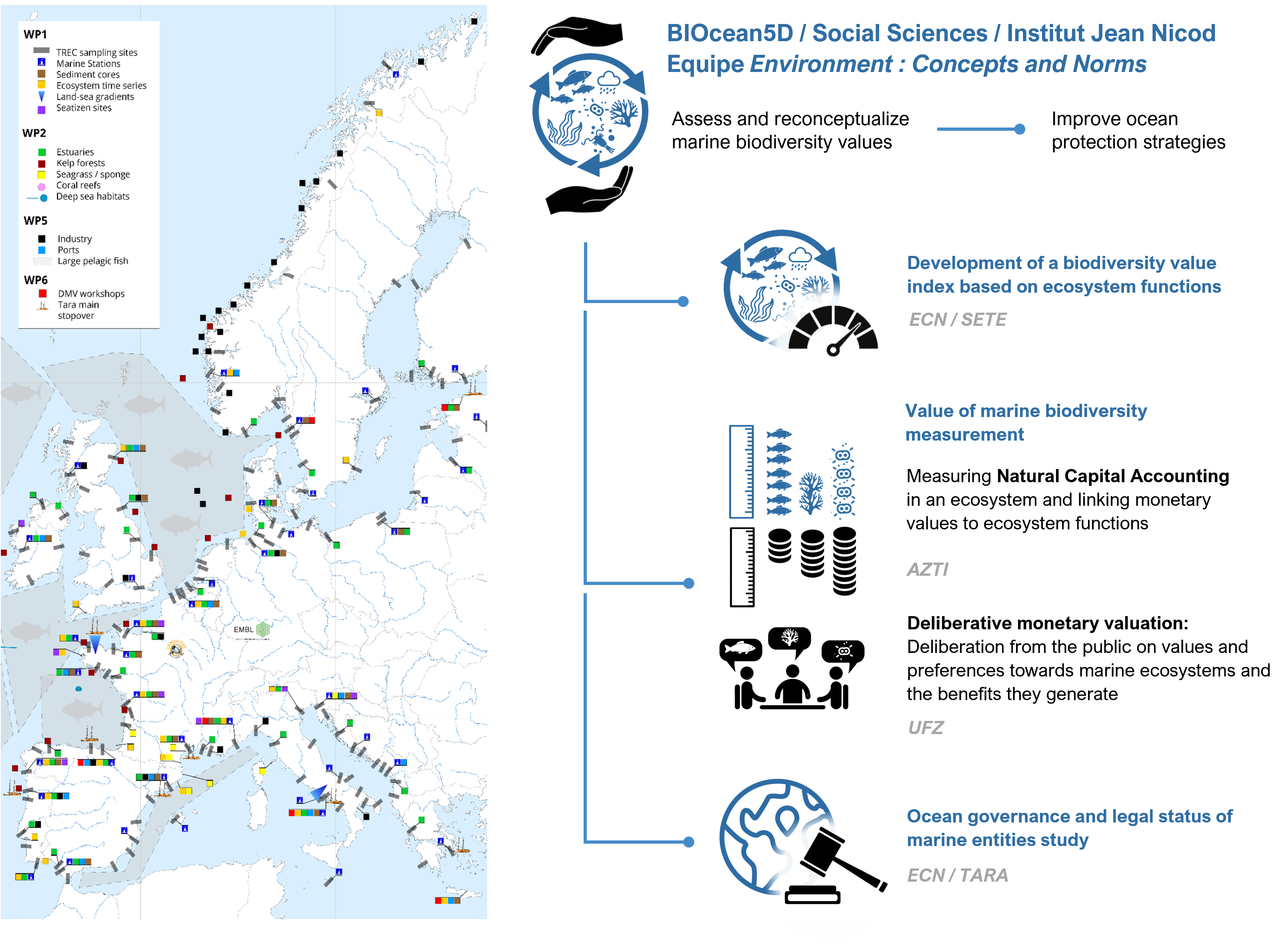Home > News > FUNDING ǀ Social sciences to reveal the value of marine ecosystems
FUNDING ǀ Social sciences to reveal the value of marine ecosystems
Marine biodiversity sustains ecosystems which are essential for planetary and human health, yet their abundance, functions, and associated values are still poorly understood. BiOcean5D is a new project that will address this knowledge gap, bringing together 29 research institutes from 11 countries. The team “Environment : Concepts and Norms” (ECN-Team) from the Institut Jean-Nicod will be involved, alongside, among others, EMBL (1), EMBRC (2), and Genoscope. The project’s overarching objective is to explore biodiversity at the molecular level from viruses to mammals, across space and time, and to find better ways to assess biodiversity’s value for humans and the best governance mechanisms that would make that value sustainable. BiOcean5D has received €16 million from the European Commission and a further €1.2 million from the Swiss government to conduct work that will contribute to the long-term preservation of marine life and the development of new indicators of marine biodiversity. The new data and knowledge will provide vital information for policymakers.
BiOcean5D will build a unique suite of technologies and protocols to sample aerosols, deep ocean sediments, and critical marine habitats at 120 selected sites across European coasts. New and existing data will be harmonised and made openly available through international data hubs. With this data on marine ecology, the project will inform and build new theories and models of marine biodiversity, as well as provide a portfolio of indicators on marine ecosystem health.
Combining Theoretical-, Applied-, and Policy-based Approaches to Valuation
In a unique and interdisciplinary approach, BiOcean5D will also analyse the dynamic and functional complexity of marine life at the molecular level in terms of its economic and legal value. The project’s work-package concerned with this task will be coordinated by the ECN-Team at Institut Jean-Nicod.
Led by the ECN-Team, one pillar of the work-package will be modelling the contribution of biological functions to the value of biodiversity in order to develop a biodiversity value index that integrates the functional relevance of species in an ecosystem. The ECN-Team will undertake this work together with the CNRS for Theoretical and Experimental Ecology Research Station (SETE) (3).
Additionally, The ECN-Team will employ two complementary methodologies to measure the economic value of ecosystem functions. The first methodology is Natural Capital Accounting, which consists in measuring the physical stocks and flows of natural resources in a given ecosystem. In a second step, monetary values will be associated with the identified ecosystem functions, based on market data on direct and indirect use values.
The second methodology relies on values elicited from the public, instead of market data. It is called Deliberative Monetary Valuation (DMV) and involves deliberation between participants in order to uncover the diversity of values and preferences towards marine ecosystems and the benefits they generate. Fifteen DMV workshops in coastal communities will be organised and carried out by the ECN-Team together with the Helmholtz Centre for Environmental Research.
Finally, the ecological implications of marine entities and their legal statuses will be explored in collaboration with the Tara Ocean Foundation (4), and several academic research centres in maritime international law (Utrecht University, Rutgers University, and Haifa University). Through these partnerships, the ECN-Team will examine alternative approaches to area- or species-based conservation strategies by focusing on the protection of ecosystem functions as well as strategies to manage biodiversity beyond national jurisdictions.
In order to develop a truly holistic approach to ecosystem protection, the ECN-Team will provide interdisciplinary research strategies from law, economics and philosophy as part of a robust collaborative network. Through BiOCean5d, the ECN-Team aims to contribute to the fundamental reconceptualization of how we value and evaluate marine biodiversity.

Left : Location of the 120 European sites explored during BIOcean5D. Right Droite : The role of social sciences and the involvement of the ECN (Environment : Concepts and Norms) team of the Institut Jean Nicod in BIOcean5D
- European Molecular Biology Laboratory (EMBL)
- European Marine Biological Resource Center (EMBRC)
- Station d’écologie théorique et experimentale (SETE)
- https://fondationtaraocean.org/en/home/
- AZTI : Fundacion AZTI, Espagne
- UFZ : Helmholtz Centre for Environmental Research, Allemagne





